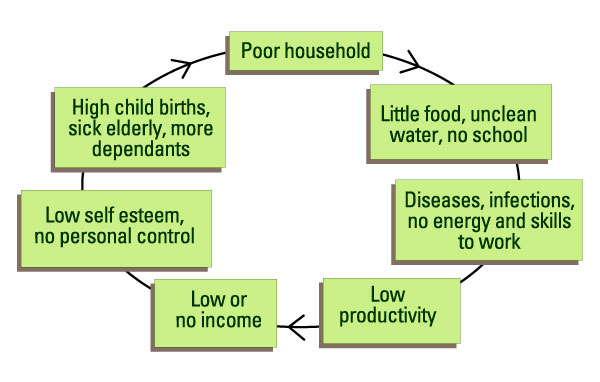- Poverty
The Vicious Cycle of Poverty
This is a phenomenon used often by economic scientists. It simply means poverty begets poverty. It is a concept that illustrates how poverty causes poverty and traps people in poverty unless an external intervention is applied to break the cycle.
A mere 12 percent of the world’s population uses 85 percent of its water, and they do not live in the Third World. —Source: Maude Barlow, Water as Commodity – The Wrong Prescription, The Institute for Food and Development Policy, Backgrounder, Summer 2001, Vol. 7, No. 3
Let’s look at this scenario with a family in absolute poverty.

A very poor family with children has very little to eat and have no access to health facilities. As a result, children are malnourished and unhealthy and have many health complications. They are therefore unable to go to school (even if there is a school in the next village). They grow up with no education or skill and cannot do any economic activity. Their parents die from preventable diseases as a result of the lack of health facilities, and their fate is in their hands. As the children turn adults, they find wives who are just on the same level of poverty as them, and they have their children. They hand over this condition to their children, who will also grow up in similar conditions.
It takes an intervention from governments, charity organizations, or family members who are better off to step in and provide some kind of assistance (health, feeding, shelter, and basic education) to get the youth to do some kind of economic activity to bring in some income. Without that, this cycle will continue for generations and it’s a trap that is extremely difficult to get out of.
This concept can also be applied to countries and larger economies, although the dynamics may be slightly different.
